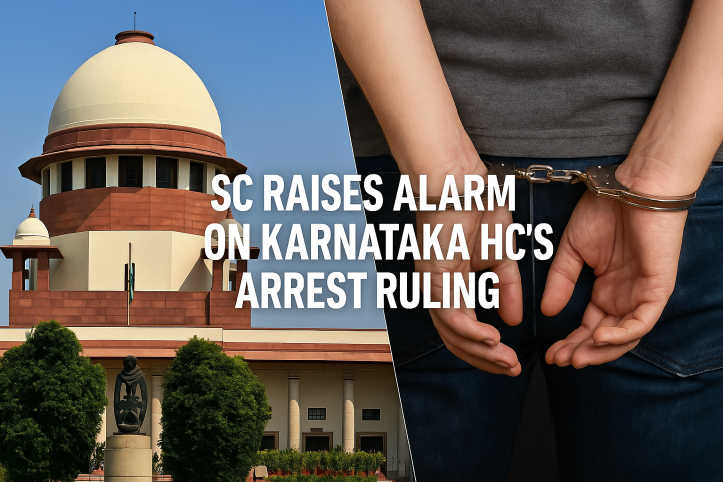In a move that has stirred legal circles across the country, the Supreme Court of India on June 27, 2025, expressed serious concerns over a recent Karnataka High Court judgment mandating that police provide written grounds of arrest to accused individuals at the time of arrest. What has sparked nationwide attention is not the mandate itself—but its retroactive application, which legal experts warn could threaten the legality of thousands of past arrests.
A wider constitutional bench hearing has been scheduled for mid-July, as the apex court steps in to evaluate the consequences and constitutional implications of the High Court’s decision.
🧑⚖️ What Did the Karnataka High Court Rule?
Earlier this year, the Karnataka High Court ruled that arresting officers must furnish the written grounds for detention at the time of arrest. While such transparency aligns with international standards on due process and individual liberty, the controversy arose when the court retroactively applied this directive to earlier arrests made under Indian Penal Code (IPC) and Unlawful Activities (Prevention) Act (UAPA) cases.
This has led to a flurry of petitions being filed in lower and trial courts across Karnataka, where accused individuals are seeking bail or case dismissal on procedural grounds. In some instances, courts have granted relief based on the retroactive logic, while others remain undecided—creating a legal inconsistency that has reached the national stage.
🧭 Supreme Court Intervenes with Caution
Concerned by the legal chaos such retroactive enforcement might unleash, the Supreme Court has put a pause on all proceedings that seek to exploit the High Court’s ruling for past cases. The bench, led by Justice Sanjiv Khanna, remarked that “past arrests conducted under lawful procedure of that time cannot be judged by future standards.”
The justices emphasized that while the protection of civil liberties is paramount, changes in criminal procedure must adhere to principles of natural justice. “What is legally required now cannot be demanded retroactively,” said the bench. Legal norms, the Court argued, cannot be rewritten in hindsight.
📜 Legal Precedent and Constitutional Boundaries
Legal scholars have weighed in with split opinions. While some praise the High Court for reinforcing the rights of the accused and ensuring better accountability in arrests, others believe the retroactive application overreaches constitutional limits.
“Even in constitutional jurisprudence, a law declared unconstitutional cannot automatically void past actions unless specified. That’s true for judgments too,” said legal expert Dr. Ananya Rao of National Law School Bengaluru.
Indeed, India’s criminal justice system is already burdened with procedural delays, undertrial backlogs, and overcrowded jails. If past arrests—made lawfully as per norms then in force—are invalidated now, it could overwhelm the system and possibly release serious offenders on technical grounds.
📉 Implications for Law Enforcement
Police departments across Karnataka are now in a state of uncertainty. Several officers have raised concerns about whether prior FIRs and chargesheets could be dismissed if arrests are challenged based on the HC ruling. According to the Karnataka Director General of Police, internal legal consultations are underway to understand the implications and frame a uniform response.
“There is anxiety among officers. Some past arrests were made without the now-required written notice. If courts start invalidating them, a dangerous precedent may be set,” said a senior police official from Bengaluru on condition of anonymity.
In response, the State Legal Department has asked for clarity from the Union Ministry of Law and Justice, seeking guidance on how to handle current appeals tied to the High Court’s decision.
🕊️ Liberty vs Security: The Ongoing Debate
The Karnataka High Court’s judgment stems from a growing push for accountability in Indian policing, especially in light of increasing custodial deaths and wrongful arrests. Written grounds of arrest can empower the accused and ensure more transparent trials.
However, the current legal clash underscores the delicate balance between protecting civil liberties and maintaining law enforcement efficacy. The Supreme Court has indicated that while such reforms are welcome, they must be phased and prospectively applied.
Already, advocacy groups and civil rights activists have welcomed the Supreme Court’s intervention, stating that clarity is essential not just for police or courts—but also for victims, undertrials, and society at large.
🔎 What to Expect in July’s Constitutional Hearing
The upcoming Supreme Court hearing in mid-July is likely to set a major precedent on how procedural reforms in criminal justice are implemented in India. Among the key issues that will be debated are:
- Can courts retroactively apply procedural mandates?
- Do changes in arrest procedure affect the substantive validity of ongoing cases?
- What safeguards can be introduced to avoid procedural misuse?
The verdict may also influence how other High Courts interpret individual rights under Article 21 of the Constitution (Protection of Life and Personal Liberty).
📌 Final Thoughts
India’s judicial system stands at a crossroads—one that pits evolving procedural rights against the rigidities of past practice. As Karnataka becomes the epicenter of this legal conundrum, the Supreme Court’s final ruling could redefine how arrests are conducted across the country.
The outcome of the July hearing will not only decide the fate of thousands of pending cases but may also usher in a new era of accountability and clarity in India’s criminal justice system.

